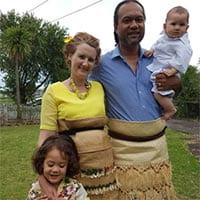CLeaR Fellows 2018 – Sonia Fonua
Lalanga ha kaha’u monu’ia – Embedding Indigenous knowledge, values, and culture for Māori and Pasifika Student Success
 Malo ‘e lelei! My name is Sonia Fonua and I am the FMHS CLEAR Fellow for 2018. I am one of the Poutatai of Te Hikita te Ora, the Certificate in Health Sciences, which is a bridging/foundation course for Maori and Pasifika students interested in pursuing a career in health programmes offered by the University of Auckland. On this programme I teach courses focused on biology, anatomy and physiology. I am also currently a part-time doctoral student in Critical Studies in Education within the Faculty of Education and Social Work, University of Auckland. My research interests focus on ethnic disparities in education, ways to embed indigenous knowledge and develop effective teaching and learning methods for indigenous and minority students. I also have two young sons who are my inspiration to help improve the education system for Pasifika, aiming to ensure they have positive educational experiences and are in a learning environment that encourages them to be themselves.
Malo ‘e lelei! My name is Sonia Fonua and I am the FMHS CLEAR Fellow for 2018. I am one of the Poutatai of Te Hikita te Ora, the Certificate in Health Sciences, which is a bridging/foundation course for Maori and Pasifika students interested in pursuing a career in health programmes offered by the University of Auckland. On this programme I teach courses focused on biology, anatomy and physiology. I am also currently a part-time doctoral student in Critical Studies in Education within the Faculty of Education and Social Work, University of Auckland. My research interests focus on ethnic disparities in education, ways to embed indigenous knowledge and develop effective teaching and learning methods for indigenous and minority students. I also have two young sons who are my inspiration to help improve the education system for Pasifika, aiming to ensure they have positive educational experiences and are in a learning environment that encourages them to be themselves.
“Lalanga ha kaha’u monu’ia – Embedding Indigenous knowledge, values, and culture for Māori and Pasifika Student Success.”
When looking for ways to improve teaching and learning it makes sense to utilise the culture of the students who are struggling in a system dominated by another worldview. Acknowledging and including indigenous knowledge is one way to counter the dominance of western content and pedagogy in education, thus creating inclusive learning environments that would have potential to increase the achievement of minority students (Thaman, 2003).
My fellowship goal is to enable courses across the University to identify ways to embed or influence their teaching and learning with Māori and/or Pasifika values, culture and knowledge (MPVCK). My interest in this area, and the reflection and critique of my own teaching practice has been informed by my current teaching environment as well as my ongoing doctoral studies exploring Tongan students’ experiences of secondary and university science courses, regarding engagement, retention, enjoyment, achievement and ‘success.’ For example, I have driven the development of a karakia for my labs, to acknowledge the spiritual values of my Māori and/or Pasifika (M/P) students and to help them feel more comfortable in this very western learning space. Other examples in my courses include using analogies that speak to M/P culture and an assignment where students describe an indigenous healing practice alongside a western classification of the human body. These changes create space for students to culturally identify with, empowering them to reclaim and (re)present their indigenous knowledge and themselves.
The Tongan student voice in my research has also provided valuable and actionable insights about current science education at the UoA. However, waiting until my doctoral studies are published does not enable the UoA to consider and action institutional change now that could immediately contribute positively to M/P student success.
Therefore, I intend to partner with courses (FMHS and FoS etc.) interested in learning about and embedding MPVCK. With support from cultural advisors, we hope to explore and determine how to best and appropriately achieve this. These advisors would provide guidance, insight and perspective on the current content and delivery approach to expand or develop a more culturally responsive approach. Although achievable through critique and reflection of course delivery and current best practice in research and peer-discussion within UoA, it is important to have authentic guidance from community cultural experts. Some funding would be used to pay cultural experts koha and for kai to support this process.
The funding would also support reflection by science education stakeholders via focus groups and meetings (see ‘Evaluation’ for more detail) with teaching staff (e.g. MEDSCI142, POPLHTH111 and BIOSCI107) and M/P students to determine how the changes have impacted on student success. It is also important to ensure course personnel are empowered to take time out of routine and dedicate time for higher level critical engagement. Offering monthly hui throughout the year for reflection by engaged staff to reflect could assist this while also creating space for collaboration and dissemination with other interested teaching staff of Semester Two courses.